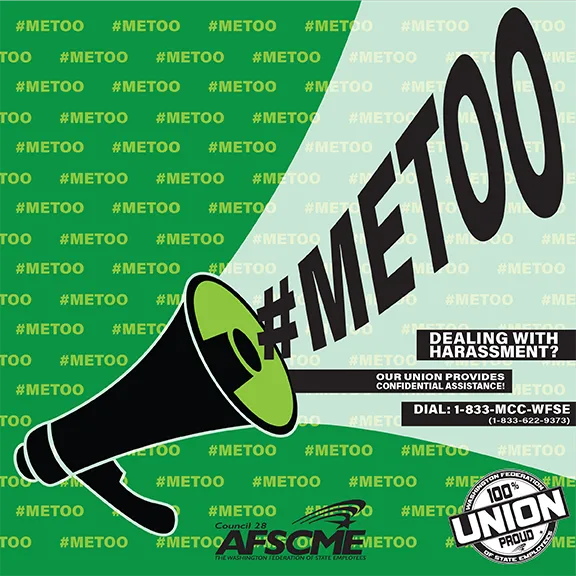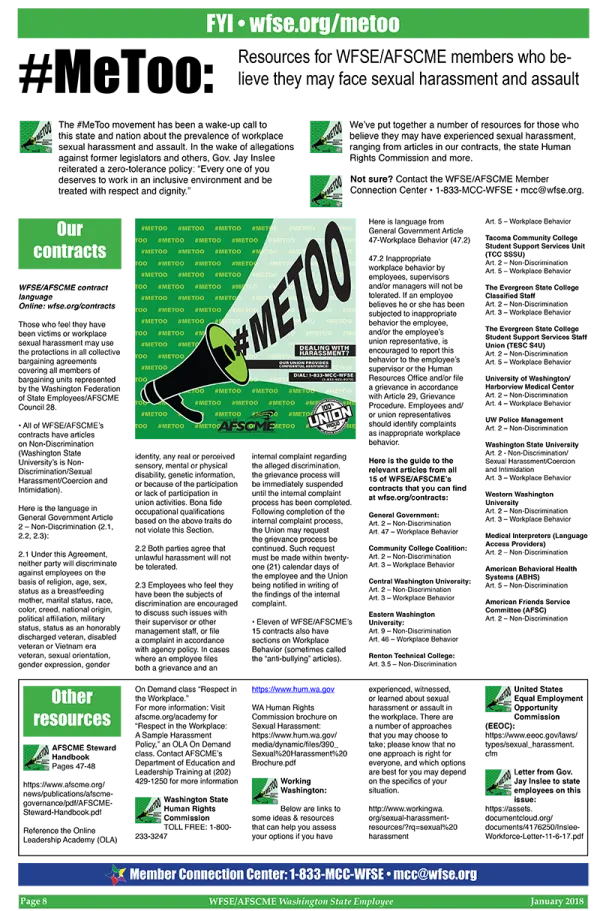#MeToo

In the news
- #MeToo sparks poignant hearing
WFSE HOTLINE 1/29/2018
#MeToo Movement Has Lawmakers Talking About Consent
Stateline (PEW Charitable Trusts Jan 2018)Legislation in Olympia targets sexual harrassment in the workplace
Seattle Times- Six in ten have hope for lasting change on sexual harassment
ABC News
#MeToo Resources
from our union, AFSCME Council 28 (WFSE)
The #MeToo movement has been a wake-up call to this state and nation about the prevalence of workplace sexual harassment and assault. In the wake of allegations against former legislators and others, Gov. Jay Inslee reiterated a zero-tolerance policy: “Every one of you deserves to work in an inclusive environment and be treated with respect and dignity.”
And to repeat what Lynne Dodson, secretary-treasurer of the Washington State Labor Council, challenged us in the labor movement to do:
“A change has come. It was a long time coming, but at last, there are consequences for those who sexually harass women. But why now? And how can we sustain lasting change?” http://www.thestand.org/2017/11/metoo-power-shift-must-be-sustained/
We’ve put together a number of resources for those who believe they may have experienced sexual harassment, ranging from articles in our contracts, the state Human Rights Commission and more. See full text at wfse.org/metoo
Here’s a summary:
- Not sure? Contact the WFSE/AFSCME Member Connection Center • 1-833-MCC-WFSE • [email protected].
- WFSE/AFSCME contract language wfse.org/contracts
Those who feel they have been victims or workplace sexual harassment may use the protections in all collective bargaining agreements covering all members of bargaining units represented by the Washington Federation of State Employees/AFSCME Council 28.
All of WFSE/AFSCME’s contracts have articles on Non-Discrimination (Washington State University’s is Non-Discrimination/Sexual Harassment/Coercion and Intimidation).
Most of WFSE/AFSCME’s contracts also have sections on Workplace Behavior.
- AFSCME Steward Handbook pages 47-48
- Sexual Harassment
The U.S. Supreme Court ruled that sexual harassment is illegal sex discrimination covered by Title VII of the Civil Rights Act. Sexual harassment subjects an employee to adverse working conditions that have nothing to do with job performance. Management is legally responsible for the actions of its employees if it knew or should have known of the problem and did nothing to stop it. The victim, as well as the harasser, may be a man or woman; the victim and harasser do not have to be of the opposite sex.
Sexual harassment is any unwelcome sexual advance, request for sexual favors or other conduct of a sexual nature when:
Submission to the conduct is either an explicit or implicit term of employment; submission to or rejection of the conduct becomes the basis for employment decisions; or the conduct interferes with an employee’s work performance or creates a work environment that is intimidating, hostile or offensive.
- What stewards can do:
Educate co-workers about sexual harassment; take necessary actions to ensure that sexual harassment will not be tolerated; discuss the issue at labor/management meetings.
When sexual harassment does occur, act to protect members by offering support and investigating and processing appropriate grievances; assist members if they wish to file a complaint with the Equal Employment Opportunities Commission (EEOC); and reference the Online Leadership Academy (OLA) On Demand class “Respect in the Workplace.”
For more information: Visit afscme.org/academy for “Respect in the Workplace: A Sample Harassment Policy,” an OLA On Demand class. Contact AFSCME’s Department of Education and Leadership Training at (202) 429-1250 for more information.
- Washington State Human Rights Commission
TOLL FREE: 1-800-233-3247 www.hum.wa.gov
WA Human Rights Commission brochure on Sexual Harassment:
- Working Washington:
Below are links to some ideas & resources that can help you assess your options if you have experienced, witnessed, or learned about sexual harassment or assault in the workplace. There are a number of approaches that you may choose to take; please know that no one approach is right for everyone, and which options are best for you may depend on the specifics of your situation.
http://www.workingwa.org/sexual-harassment-resources/?rq=sexual%20harassment
- United States Equal Employment Opportunity Commission (EEOC): https://www.eeoc.gov/laws/types/sexual_harassment.cfm
Letter from Gov. Jay Inslee to state employees on this issue: https://assets.documentcloud.org/documents/4176250/Inslee-Workforce-Letter-11-6-17.pdf
More background information
- Time Magazine: The "silence breakers" — the women behind this year's #MeToo movement against sexual harassment — are Time magazine's 2017 person of the year. More: http://time.com/time-person-of-the-year-2017-silence-breakers/?xid=homepage&pcd=hp-magmod
- #MeToo power shift must be sustained by organized labor. Unions can lead the way on empowering women, ending sexual harassment. From Lynne Dodson, Secretary-Treasurer, Washington State Labor Council: http://www.thestand.org/2017/11/metoo-power-shift-must-be-sustained/
- Want to Fight Sexual Harassment and Discrimination? Unionize. This advice from two noted advocates and researchers (we've worked closely with Marilyn Watkins over the years) is valid for all public employees, academic and non-academic. The headlines disturb us -- and move us to act. https://www.seattleweekly.com/opinion/want-to-fight-sexual-harassment-and-discrimination-unionize/
- ‘Stand With Us’ group wants lawmakers to take politics out of sexual harassment reporting. Read more here: http://www.theolympian.com/news/politics-government/article187426398.html#storylink=cpy

